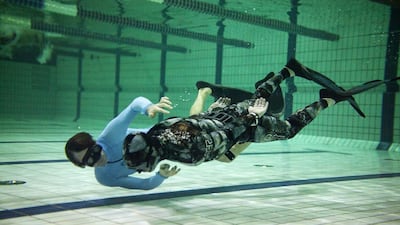ABU DHABI // Helvis Blanco used to freedive alone. He could stay under water for about two minutes.
But about three years ago, after reading about freediving accidents, the Filipino sales engineer stopped.
Helvis realised he needed a reliable, trained companion to stay safe. He had dived with friends before but they were not trained.
“Freediving with company doesn’t mean it’s already safe,” said Helvis, 44. “The guy who is watching over you should be able to rescue you if something happens.”
Adel Ait-Ghezala, 35, an Algerian freediver, went missing on New Year’s Day while spearfishing with friends off Dubai.
The body of the PhD student, who was an experienced freediver, was found on January 11, three kilometres from where he went missing.
Freediving and spearfishing are growing in popularity, but experts say too many people in the UAE are taking part without enough training, and without understanding the dangers.
And the sport, also called apnoea or breath-hold diving, has its share of those.
A main concern for recreational freedivers is blackout caused by hypoxia, or loss of oxygen.
As the diver swims towards the surface, when they have the least amount of oxygen, water and oxygen pressure rapidly decreases and they can lose consciousness with little or no warning.
Freedivers learn to tolerate hypoxia but Dr Shabeer Nellikode, neurologist and managing director of Universal Hospital in Abu Dhabi, said techniques should be learnt from professionals, especially if the diver smoked or had health conditions.
“The body has an extra capacity to accommodate hypoxic injuries but this has to be done with professional advice,” Dr Nellikode said.
Other risks include “lung squeeze”, where lungs become compressed because of growing water pressure during the descent, and blood vessels can leak inside them.
While ascending, lungs can overexpand in some circumstances and even rupture.
Freedivers say they feel more connected with the water without heavy equipment. Others want to test their bodies’ limits, seeing how deep they can go and for how long.
The sport seems popular among Emiratis, said Dr Barbara Karin Vela, a general practitioner with expertise in diving medicine. Freediving for pearls was a traditional UAE livelihood.
But Dr Karin Vela said the sport could be more dangerous than Scuba diving.
“I think, in general, it can be more dangerous because in freediving you really depend on your body,” she said.
“It takes a lot of training to go deeper and longer. It’s a more risky sport where you need to perform well.”
Freediving UAE is an association that trains people on breathing techniques and safety measures. Instructors are certified by Aida, an international association that sets standards and holds competitions.
The local association’s co-founder, Alex Boulting, said there was a lack of knowledge of the physiology involved, even among people who had been freediving for a long time.
“I have trained spearfishermen who have told me some horrific stories about what happened to them,” said Alex, 45, who has been freediving since 2008.
He said spearfishermen should be educated in how to dive efficiently and how to recover.
“I think all of those things would potentially eliminate the risks for spearfishermen. Spearfishing is very popular in the UAE,” Alex said.
He teaches the divers ways to relax and prepare for dives. They practise three-way breathing – with the diaphragm, chest and throat – to fill their lungs to capacity, and stretching and meditation.
Then they get into a pool to practice holding their breath while still and while moving.
The sport is not inherently dangerous if you follow safety guidelines, Alex said. With freediving, “you’re in touch with your body and your feelings” rather than relying on equipment.
But he said the competitive side of freediving was much more dangerous.
Alex’s close friend and co-founder of the association was champion freediver Adel Abu Haliqa, who went missing in Greece in 2011 while training for a “no limits” competition, where competitors use a weighted sled to descend, then use a flotation device to reach the surface.
He said his friend’s death made him more aware of the dangers.
“I think that should be the last thing you think of when you’re freediving,” Alex said. “You want to prove to people how deep you can go, and that takes you down the wrong path.”
For more information, visit freedivinguae.com.
lcarroll@thenational.ae

